Analysis of Coles Supermarket's Supply Chain Sustainability Practices
VerifiedAdded on 2020/06/06
|10
|2907
|160
Report
AI Summary
This report provides a comprehensive analysis of Coles Supermarket's supply chain management, focusing on its sustainability practices. It examines the company's adoption of various models and theories, including the Replenishment and Pick and Pack models, to enhance its supply chain efficiency. The report delves into Coles' environmental, social, and economic sustainability initiatives, highlighting its efforts to reduce waste, ensure product freshness, and comply with regulations. Furthermore, it critically evaluates the company's performance, addressing challenges related to data management, supplier relations, and customer satisfaction. The analysis also considers the impact of legal proceedings and the importance of maintaining strong stakeholder relationships. The report concludes with recommendations for improving Coles' supply chain, emphasizing the need for effective communication, collaboration, compliance, and community engagement to achieve long-term sustainability and success. This report is contributed by a student to be published on Desklib.
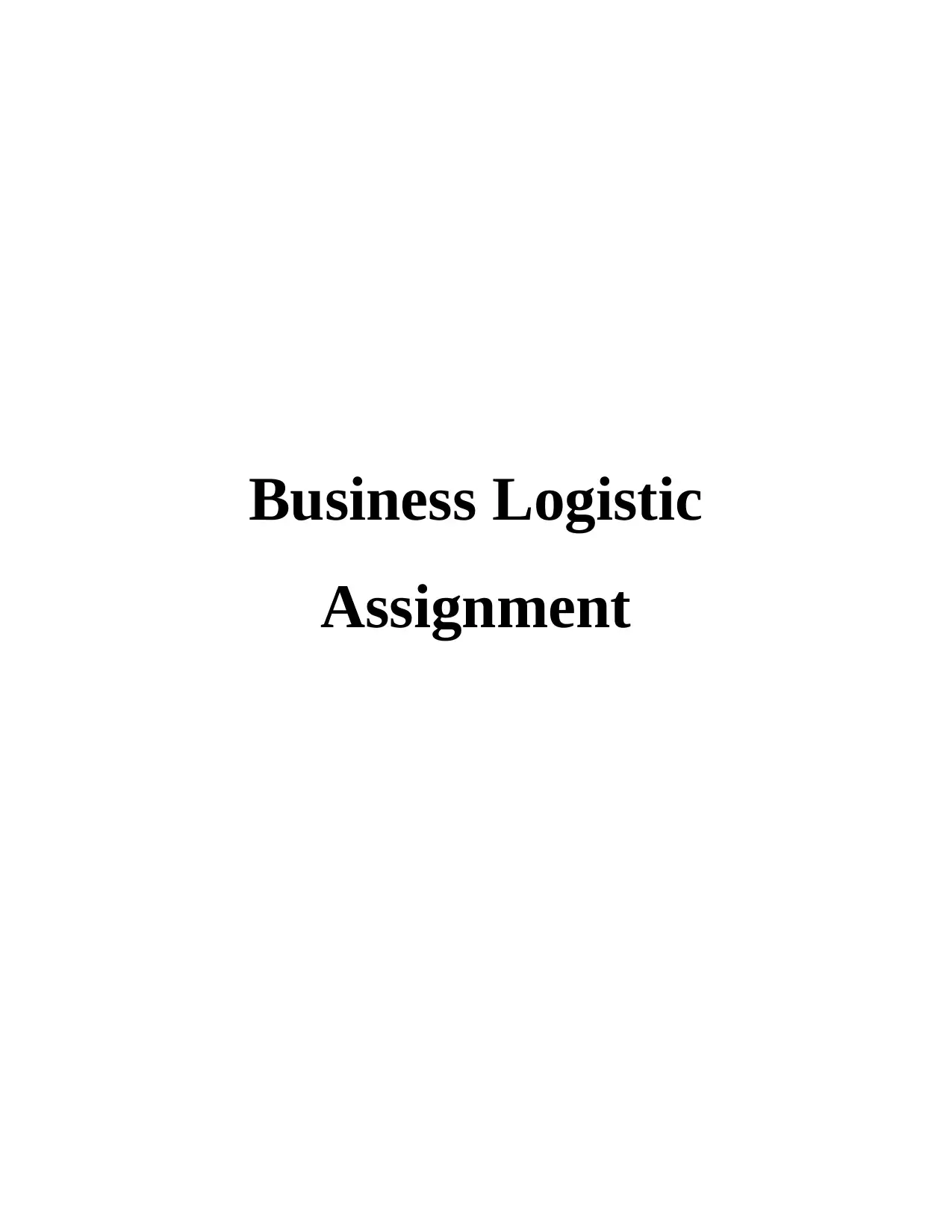
Business Logistic
Assignment
Assignment
Paraphrase This Document
Need a fresh take? Get an instant paraphrase of this document with our AI Paraphraser
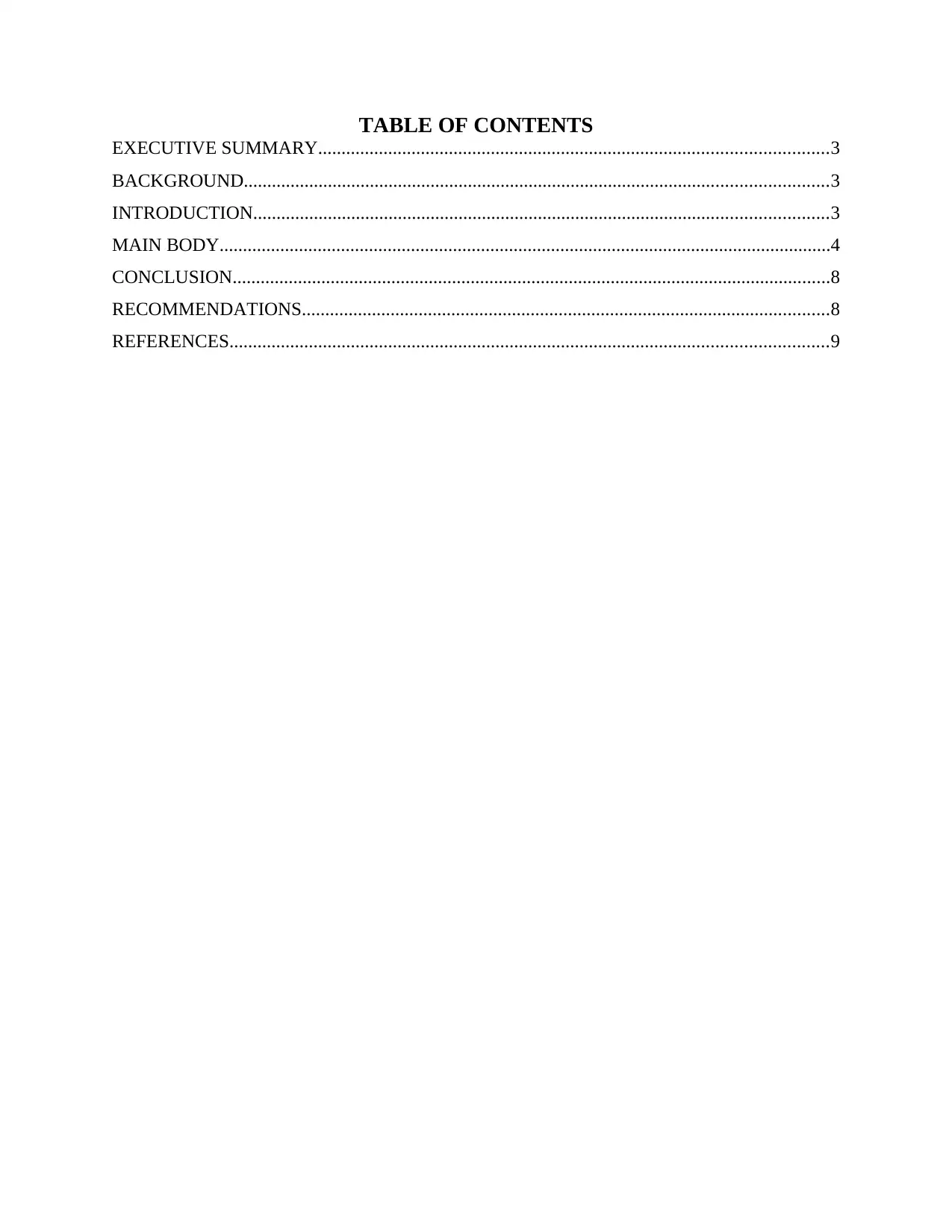
TABLE OF CONTENTS
EXECUTIVE SUMMARY.............................................................................................................3
BACKGROUND.............................................................................................................................3
INTRODUCTION...........................................................................................................................3
MAIN BODY...................................................................................................................................4
CONCLUSION................................................................................................................................8
RECOMMENDATIONS.................................................................................................................8
REFERENCES................................................................................................................................9
EXECUTIVE SUMMARY.............................................................................................................3
BACKGROUND.............................................................................................................................3
INTRODUCTION...........................................................................................................................3
MAIN BODY...................................................................................................................................4
CONCLUSION................................................................................................................................8
RECOMMENDATIONS.................................................................................................................8
REFERENCES................................................................................................................................9
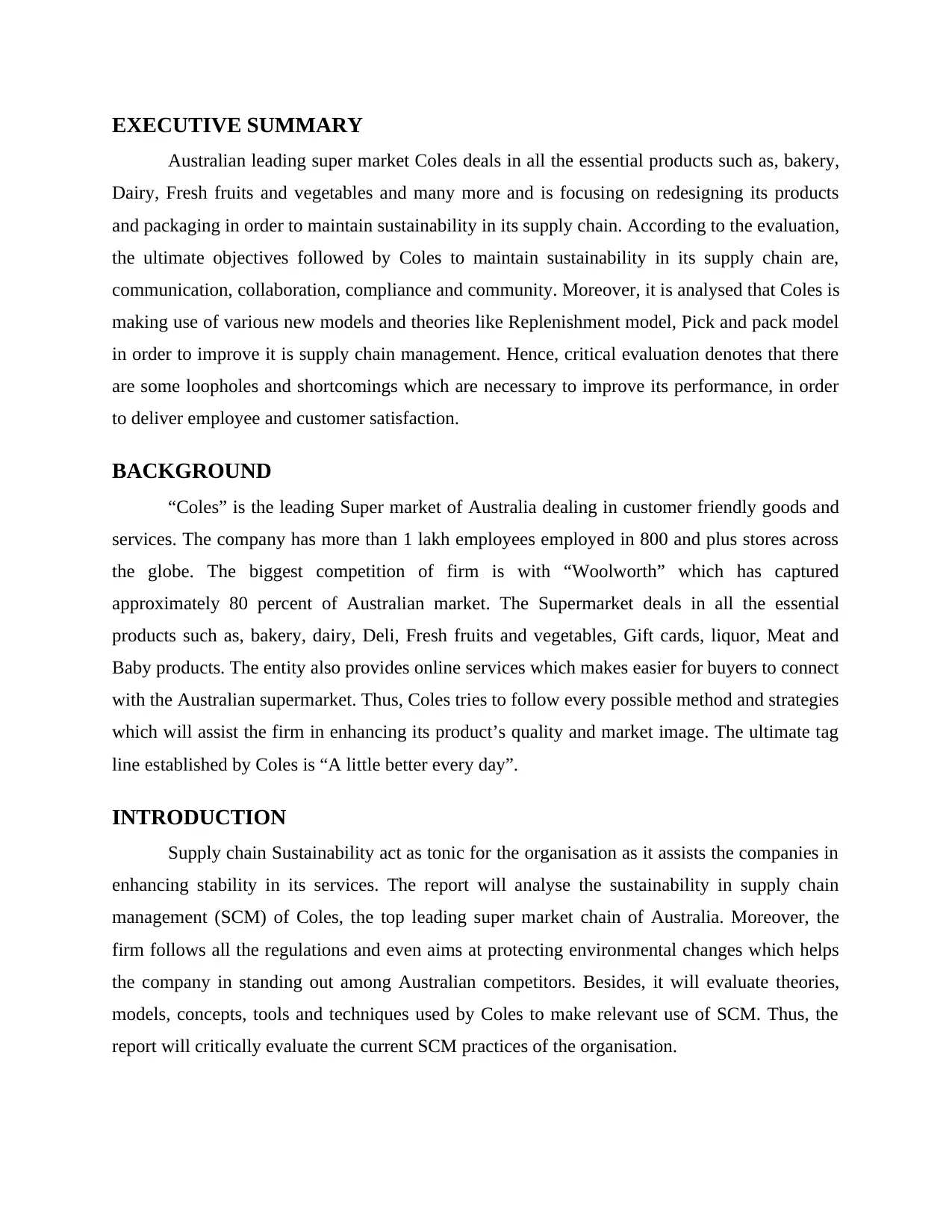
EXECUTIVE SUMMARY
Australian leading super market Coles deals in all the essential products such as, bakery,
Dairy, Fresh fruits and vegetables and many more and is focusing on redesigning its products
and packaging in order to maintain sustainability in its supply chain. According to the evaluation,
the ultimate objectives followed by Coles to maintain sustainability in its supply chain are,
communication, collaboration, compliance and community. Moreover, it is analysed that Coles is
making use of various new models and theories like Replenishment model, Pick and pack model
in order to improve it is supply chain management. Hence, critical evaluation denotes that there
are some loopholes and shortcomings which are necessary to improve its performance, in order
to deliver employee and customer satisfaction.
BACKGROUND
“Coles” is the leading Super market of Australia dealing in customer friendly goods and
services. The company has more than 1 lakh employees employed in 800 and plus stores across
the globe. The biggest competition of firm is with “Woolworth” which has captured
approximately 80 percent of Australian market. The Supermarket deals in all the essential
products such as, bakery, dairy, Deli, Fresh fruits and vegetables, Gift cards, liquor, Meat and
Baby products. The entity also provides online services which makes easier for buyers to connect
with the Australian supermarket. Thus, Coles tries to follow every possible method and strategies
which will assist the firm in enhancing its product’s quality and market image. The ultimate tag
line established by Coles is “A little better every day”.
INTRODUCTION
Supply chain Sustainability act as tonic for the organisation as it assists the companies in
enhancing stability in its services. The report will analyse the sustainability in supply chain
management (SCM) of Coles, the top leading super market chain of Australia. Moreover, the
firm follows all the regulations and even aims at protecting environmental changes which helps
the company in standing out among Australian competitors. Besides, it will evaluate theories,
models, concepts, tools and techniques used by Coles to make relevant use of SCM. Thus, the
report will critically evaluate the current SCM practices of the organisation.
Australian leading super market Coles deals in all the essential products such as, bakery,
Dairy, Fresh fruits and vegetables and many more and is focusing on redesigning its products
and packaging in order to maintain sustainability in its supply chain. According to the evaluation,
the ultimate objectives followed by Coles to maintain sustainability in its supply chain are,
communication, collaboration, compliance and community. Moreover, it is analysed that Coles is
making use of various new models and theories like Replenishment model, Pick and pack model
in order to improve it is supply chain management. Hence, critical evaluation denotes that there
are some loopholes and shortcomings which are necessary to improve its performance, in order
to deliver employee and customer satisfaction.
BACKGROUND
“Coles” is the leading Super market of Australia dealing in customer friendly goods and
services. The company has more than 1 lakh employees employed in 800 and plus stores across
the globe. The biggest competition of firm is with “Woolworth” which has captured
approximately 80 percent of Australian market. The Supermarket deals in all the essential
products such as, bakery, dairy, Deli, Fresh fruits and vegetables, Gift cards, liquor, Meat and
Baby products. The entity also provides online services which makes easier for buyers to connect
with the Australian supermarket. Thus, Coles tries to follow every possible method and strategies
which will assist the firm in enhancing its product’s quality and market image. The ultimate tag
line established by Coles is “A little better every day”.
INTRODUCTION
Supply chain Sustainability act as tonic for the organisation as it assists the companies in
enhancing stability in its services. The report will analyse the sustainability in supply chain
management (SCM) of Coles, the top leading super market chain of Australia. Moreover, the
firm follows all the regulations and even aims at protecting environmental changes which helps
the company in standing out among Australian competitors. Besides, it will evaluate theories,
models, concepts, tools and techniques used by Coles to make relevant use of SCM. Thus, the
report will critically evaluate the current SCM practices of the organisation.
⊘ This is a preview!⊘
Do you want full access?
Subscribe today to unlock all pages.

Trusted by 1+ million students worldwide
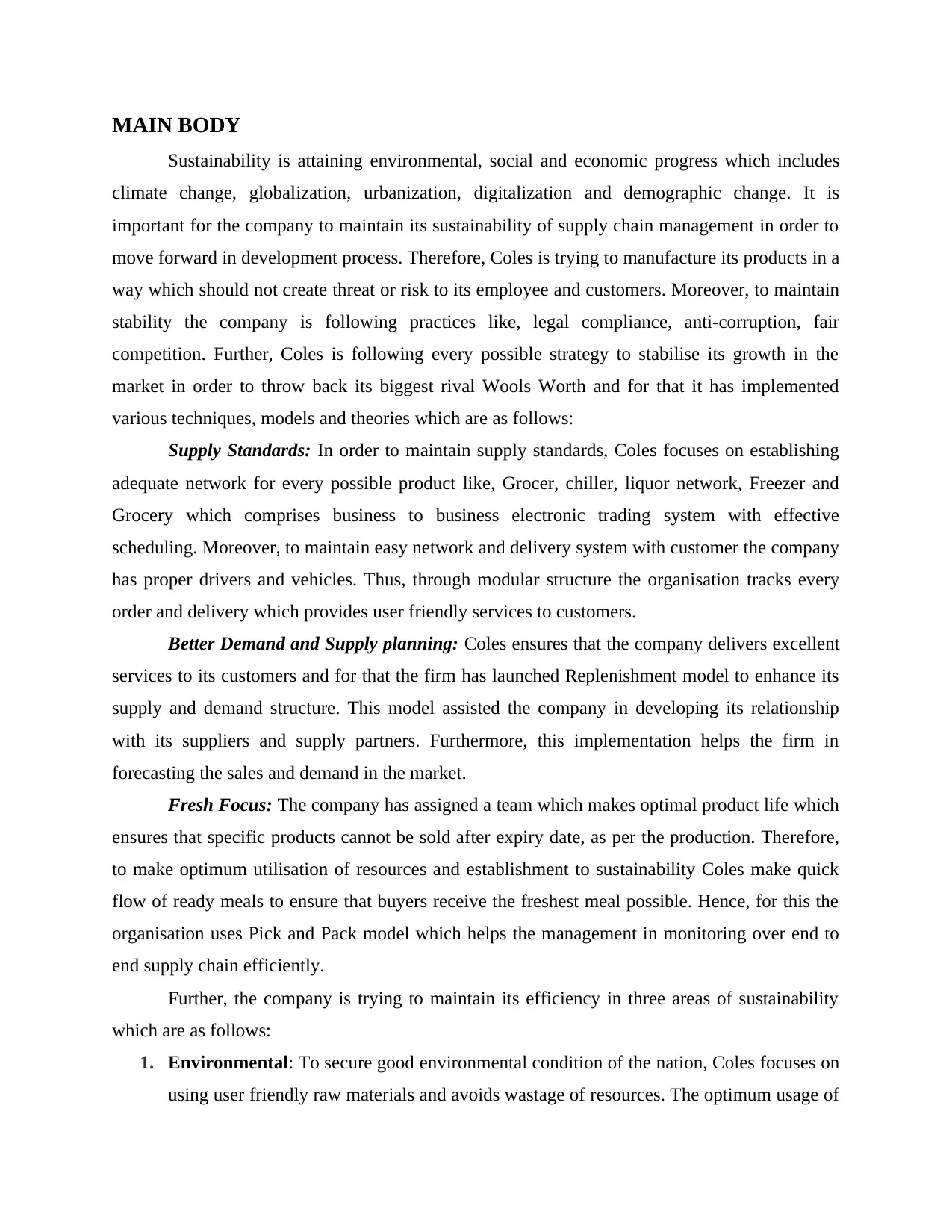
MAIN BODY
Sustainability is attaining environmental, social and economic progress which includes
climate change, globalization, urbanization, digitalization and demographic change. It is
important for the company to maintain its sustainability of supply chain management in order to
move forward in development process. Therefore, Coles is trying to manufacture its products in a
way which should not create threat or risk to its employee and customers. Moreover, to maintain
stability the company is following practices like, legal compliance, anti-corruption, fair
competition. Further, Coles is following every possible strategy to stabilise its growth in the
market in order to throw back its biggest rival Wools Worth and for that it has implemented
various techniques, models and theories which are as follows:
Supply Standards: In order to maintain supply standards, Coles focuses on establishing
adequate network for every possible product like, Grocer, chiller, liquor network, Freezer and
Grocery which comprises business to business electronic trading system with effective
scheduling. Moreover, to maintain easy network and delivery system with customer the company
has proper drivers and vehicles. Thus, through modular structure the organisation tracks every
order and delivery which provides user friendly services to customers.
Better Demand and Supply planning: Coles ensures that the company delivers excellent
services to its customers and for that the firm has launched Replenishment model to enhance its
supply and demand structure. This model assisted the company in developing its relationship
with its suppliers and supply partners. Furthermore, this implementation helps the firm in
forecasting the sales and demand in the market.
Fresh Focus: The company has assigned a team which makes optimal product life which
ensures that specific products cannot be sold after expiry date, as per the production. Therefore,
to make optimum utilisation of resources and establishment to sustainability Coles make quick
flow of ready meals to ensure that buyers receive the freshest meal possible. Hence, for this the
organisation uses Pick and Pack model which helps the management in monitoring over end to
end supply chain efficiently.
Further, the company is trying to maintain its efficiency in three areas of sustainability
which are as follows:
1. Environmental: To secure good environmental condition of the nation, Coles focuses on
using user friendly raw materials and avoids wastage of resources. The optimum usage of
Sustainability is attaining environmental, social and economic progress which includes
climate change, globalization, urbanization, digitalization and demographic change. It is
important for the company to maintain its sustainability of supply chain management in order to
move forward in development process. Therefore, Coles is trying to manufacture its products in a
way which should not create threat or risk to its employee and customers. Moreover, to maintain
stability the company is following practices like, legal compliance, anti-corruption, fair
competition. Further, Coles is following every possible strategy to stabilise its growth in the
market in order to throw back its biggest rival Wools Worth and for that it has implemented
various techniques, models and theories which are as follows:
Supply Standards: In order to maintain supply standards, Coles focuses on establishing
adequate network for every possible product like, Grocer, chiller, liquor network, Freezer and
Grocery which comprises business to business electronic trading system with effective
scheduling. Moreover, to maintain easy network and delivery system with customer the company
has proper drivers and vehicles. Thus, through modular structure the organisation tracks every
order and delivery which provides user friendly services to customers.
Better Demand and Supply planning: Coles ensures that the company delivers excellent
services to its customers and for that the firm has launched Replenishment model to enhance its
supply and demand structure. This model assisted the company in developing its relationship
with its suppliers and supply partners. Furthermore, this implementation helps the firm in
forecasting the sales and demand in the market.
Fresh Focus: The company has assigned a team which makes optimal product life which
ensures that specific products cannot be sold after expiry date, as per the production. Therefore,
to make optimum utilisation of resources and establishment to sustainability Coles make quick
flow of ready meals to ensure that buyers receive the freshest meal possible. Hence, for this the
organisation uses Pick and Pack model which helps the management in monitoring over end to
end supply chain efficiently.
Further, the company is trying to maintain its efficiency in three areas of sustainability
which are as follows:
1. Environmental: To secure good environmental condition of the nation, Coles focuses on
using user friendly raw materials and avoids wastage of resources. The optimum usage of
Paraphrase This Document
Need a fresh take? Get an instant paraphrase of this document with our AI Paraphraser
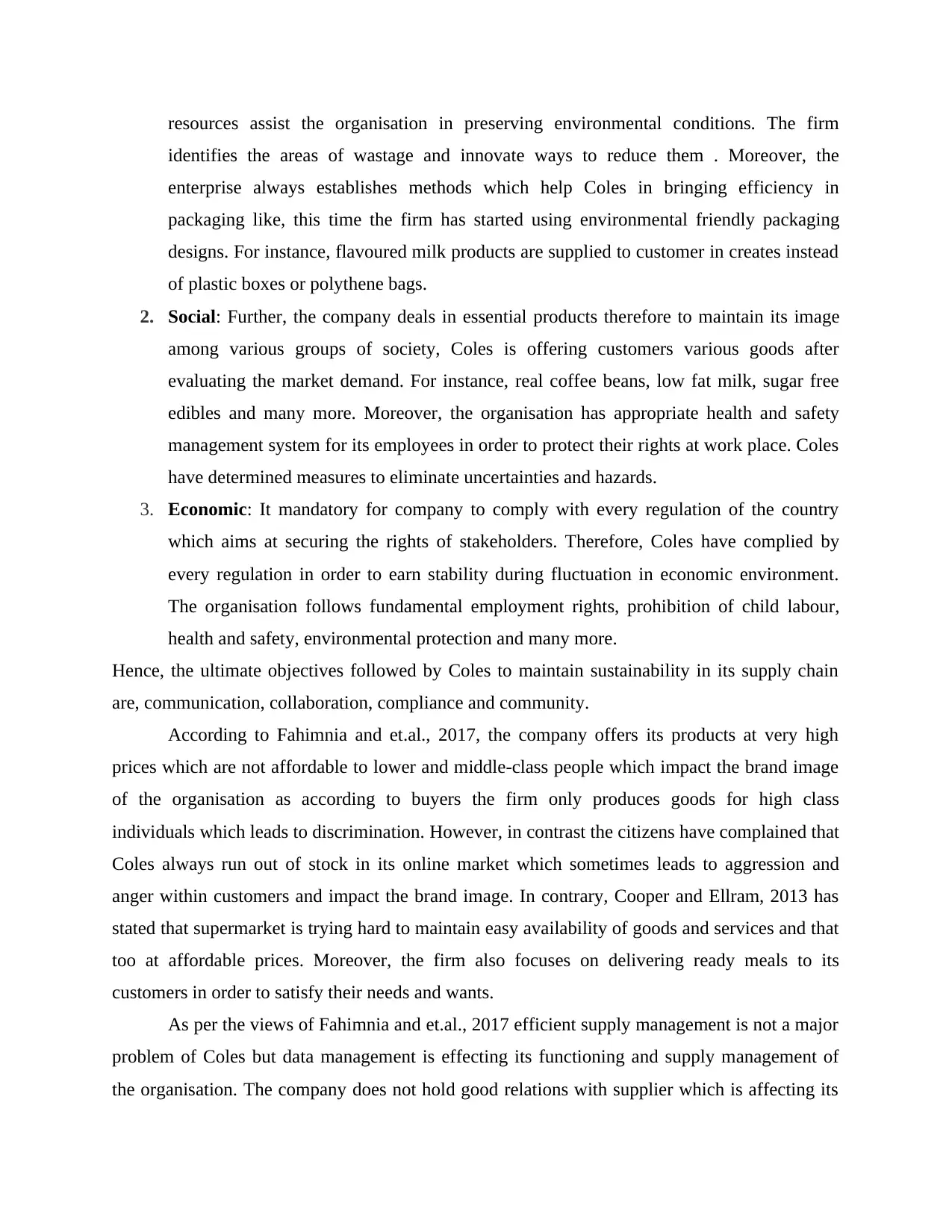
resources assist the organisation in preserving environmental conditions. The firm
identifies the areas of wastage and innovate ways to reduce them . Moreover, the
enterprise always establishes methods which help Coles in bringing efficiency in
packaging like, this time the firm has started using environmental friendly packaging
designs. For instance, flavoured milk products are supplied to customer in creates instead
of plastic boxes or polythene bags.
2. Social: Further, the company deals in essential products therefore to maintain its image
among various groups of society, Coles is offering customers various goods after
evaluating the market demand. For instance, real coffee beans, low fat milk, sugar free
edibles and many more. Moreover, the organisation has appropriate health and safety
management system for its employees in order to protect their rights at work place. Coles
have determined measures to eliminate uncertainties and hazards.
3. Economic: It mandatory for company to comply with every regulation of the country
which aims at securing the rights of stakeholders. Therefore, Coles have complied by
every regulation in order to earn stability during fluctuation in economic environment.
The organisation follows fundamental employment rights, prohibition of child labour,
health and safety, environmental protection and many more.
Hence, the ultimate objectives followed by Coles to maintain sustainability in its supply chain
are, communication, collaboration, compliance and community.
According to Fahimnia and et.al., 2017, the company offers its products at very high
prices which are not affordable to lower and middle-class people which impact the brand image
of the organisation as according to buyers the firm only produces goods for high class
individuals which leads to discrimination. However, in contrast the citizens have complained that
Coles always run out of stock in its online market which sometimes leads to aggression and
anger within customers and impact the brand image. In contrary, Cooper and Ellram, 2013 has
stated that supermarket is trying hard to maintain easy availability of goods and services and that
too at affordable prices. Moreover, the firm also focuses on delivering ready meals to its
customers in order to satisfy their needs and wants.
As per the views of Fahimnia and et.al., 2017 efficient supply management is not a major
problem of Coles but data management is effecting its functioning and supply management of
the organisation. The company does not hold good relations with supplier which is affecting its
identifies the areas of wastage and innovate ways to reduce them . Moreover, the
enterprise always establishes methods which help Coles in bringing efficiency in
packaging like, this time the firm has started using environmental friendly packaging
designs. For instance, flavoured milk products are supplied to customer in creates instead
of plastic boxes or polythene bags.
2. Social: Further, the company deals in essential products therefore to maintain its image
among various groups of society, Coles is offering customers various goods after
evaluating the market demand. For instance, real coffee beans, low fat milk, sugar free
edibles and many more. Moreover, the organisation has appropriate health and safety
management system for its employees in order to protect their rights at work place. Coles
have determined measures to eliminate uncertainties and hazards.
3. Economic: It mandatory for company to comply with every regulation of the country
which aims at securing the rights of stakeholders. Therefore, Coles have complied by
every regulation in order to earn stability during fluctuation in economic environment.
The organisation follows fundamental employment rights, prohibition of child labour,
health and safety, environmental protection and many more.
Hence, the ultimate objectives followed by Coles to maintain sustainability in its supply chain
are, communication, collaboration, compliance and community.
According to Fahimnia and et.al., 2017, the company offers its products at very high
prices which are not affordable to lower and middle-class people which impact the brand image
of the organisation as according to buyers the firm only produces goods for high class
individuals which leads to discrimination. However, in contrast the citizens have complained that
Coles always run out of stock in its online market which sometimes leads to aggression and
anger within customers and impact the brand image. In contrary, Cooper and Ellram, 2013 has
stated that supermarket is trying hard to maintain easy availability of goods and services and that
too at affordable prices. Moreover, the firm also focuses on delivering ready meals to its
customers in order to satisfy their needs and wants.
As per the views of Fahimnia and et.al., 2017 efficient supply management is not a major
problem of Coles but data management is effecting its functioning and supply management of
the organisation. The company does not hold good relations with supplier which is affecting its
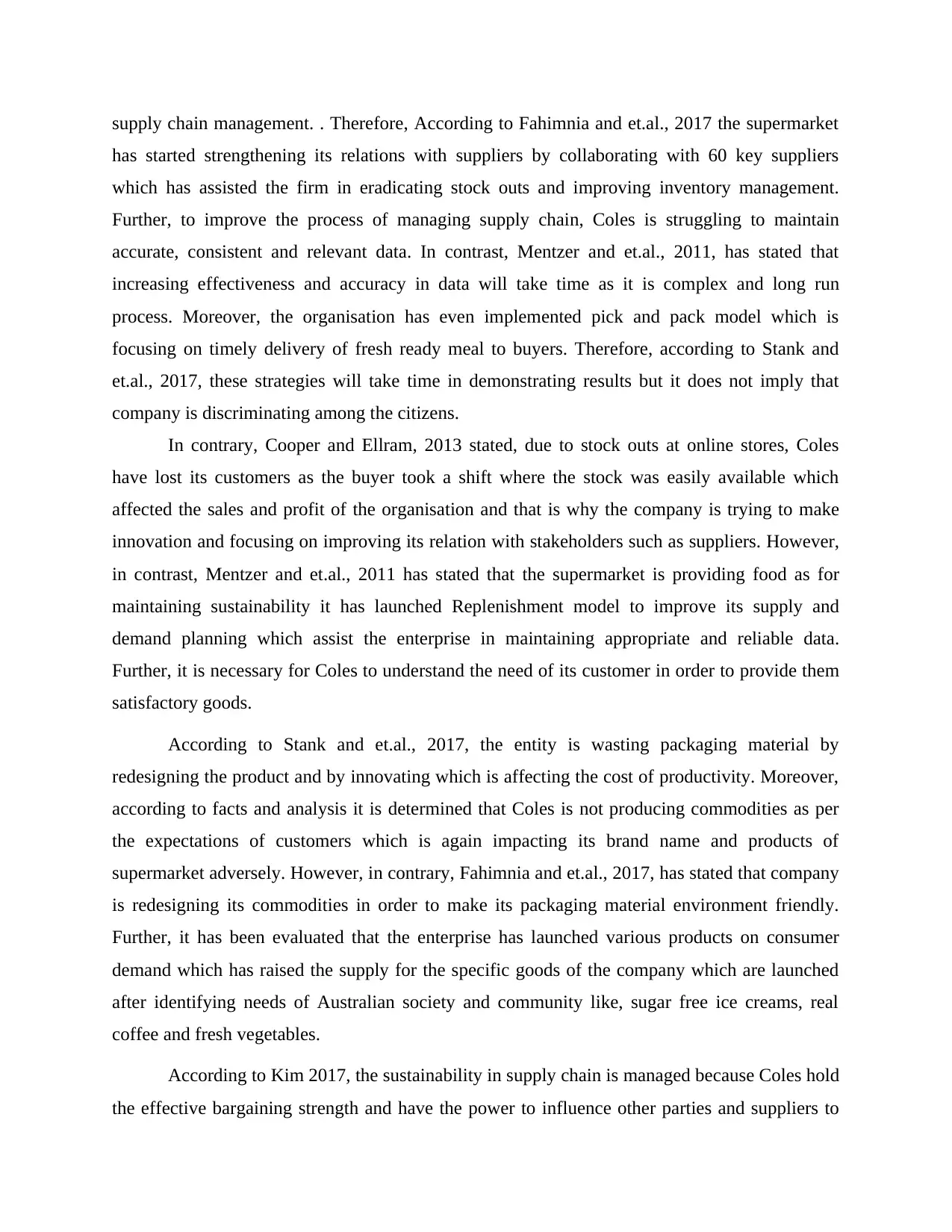
supply chain management. . Therefore, According to Fahimnia and et.al., 2017 the supermarket
has started strengthening its relations with suppliers by collaborating with 60 key suppliers
which has assisted the firm in eradicating stock outs and improving inventory management.
Further, to improve the process of managing supply chain, Coles is struggling to maintain
accurate, consistent and relevant data. In contrast, Mentzer and et.al., 2011, has stated that
increasing effectiveness and accuracy in data will take time as it is complex and long run
process. Moreover, the organisation has even implemented pick and pack model which is
focusing on timely delivery of fresh ready meal to buyers. Therefore, according to Stank and
et.al., 2017, these strategies will take time in demonstrating results but it does not imply that
company is discriminating among the citizens.
In contrary, Cooper and Ellram, 2013 stated, due to stock outs at online stores, Coles
have lost its customers as the buyer took a shift where the stock was easily available which
affected the sales and profit of the organisation and that is why the company is trying to make
innovation and focusing on improving its relation with stakeholders such as suppliers. However,
in contrast, Mentzer and et.al., 2011 has stated that the supermarket is providing food as for
maintaining sustainability it has launched Replenishment model to improve its supply and
demand planning which assist the enterprise in maintaining appropriate and reliable data.
Further, it is necessary for Coles to understand the need of its customer in order to provide them
satisfactory goods.
According to Stank and et.al., 2017, the entity is wasting packaging material by
redesigning the product and by innovating which is affecting the cost of productivity. Moreover,
according to facts and analysis it is determined that Coles is not producing commodities as per
the expectations of customers which is again impacting its brand name and products of
supermarket adversely. However, in contrary, Fahimnia and et.al., 2017, has stated that company
is redesigning its commodities in order to make its packaging material environment friendly.
Further, it has been evaluated that the enterprise has launched various products on consumer
demand which has raised the supply for the specific goods of the company which are launched
after identifying needs of Australian society and community like, sugar free ice creams, real
coffee and fresh vegetables.
According to Kim 2017, the sustainability in supply chain is managed because Coles hold
the effective bargaining strength and have the power to influence other parties and suppliers to
has started strengthening its relations with suppliers by collaborating with 60 key suppliers
which has assisted the firm in eradicating stock outs and improving inventory management.
Further, to improve the process of managing supply chain, Coles is struggling to maintain
accurate, consistent and relevant data. In contrast, Mentzer and et.al., 2011, has stated that
increasing effectiveness and accuracy in data will take time as it is complex and long run
process. Moreover, the organisation has even implemented pick and pack model which is
focusing on timely delivery of fresh ready meal to buyers. Therefore, according to Stank and
et.al., 2017, these strategies will take time in demonstrating results but it does not imply that
company is discriminating among the citizens.
In contrary, Cooper and Ellram, 2013 stated, due to stock outs at online stores, Coles
have lost its customers as the buyer took a shift where the stock was easily available which
affected the sales and profit of the organisation and that is why the company is trying to make
innovation and focusing on improving its relation with stakeholders such as suppliers. However,
in contrast, Mentzer and et.al., 2011 has stated that the supermarket is providing food as for
maintaining sustainability it has launched Replenishment model to improve its supply and
demand planning which assist the enterprise in maintaining appropriate and reliable data.
Further, it is necessary for Coles to understand the need of its customer in order to provide them
satisfactory goods.
According to Stank and et.al., 2017, the entity is wasting packaging material by
redesigning the product and by innovating which is affecting the cost of productivity. Moreover,
according to facts and analysis it is determined that Coles is not producing commodities as per
the expectations of customers which is again impacting its brand name and products of
supermarket adversely. However, in contrary, Fahimnia and et.al., 2017, has stated that company
is redesigning its commodities in order to make its packaging material environment friendly.
Further, it has been evaluated that the enterprise has launched various products on consumer
demand which has raised the supply for the specific goods of the company which are launched
after identifying needs of Australian society and community like, sugar free ice creams, real
coffee and fresh vegetables.
According to Kim 2017, the sustainability in supply chain is managed because Coles hold
the effective bargaining strength and have the power to influence other parties and suppliers to
⊘ This is a preview!⊘
Do you want full access?
Subscribe today to unlock all pages.

Trusted by 1+ million students worldwide
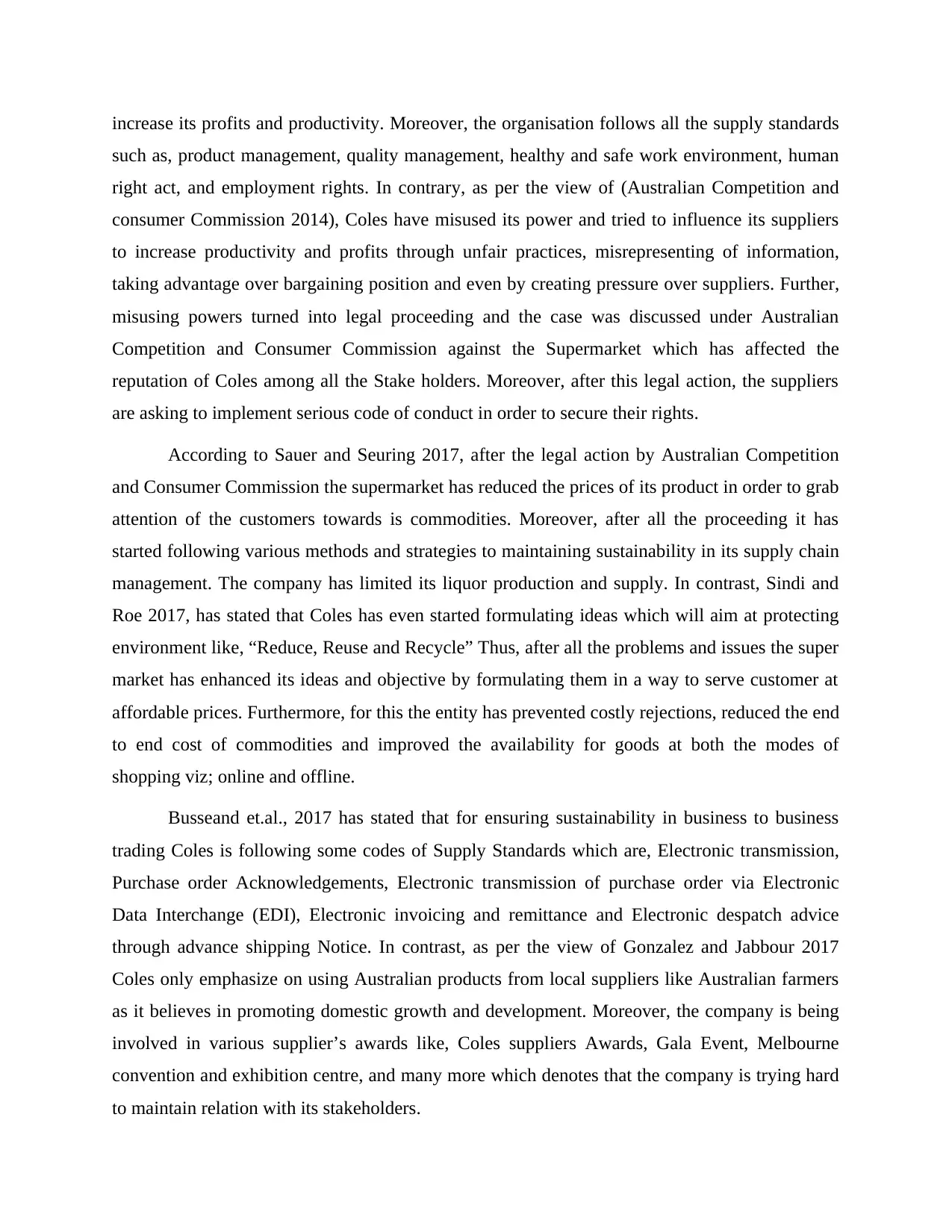
increase its profits and productivity. Moreover, the organisation follows all the supply standards
such as, product management, quality management, healthy and safe work environment, human
right act, and employment rights. In contrary, as per the view of (Australian Competition and
consumer Commission 2014), Coles have misused its power and tried to influence its suppliers
to increase productivity and profits through unfair practices, misrepresenting of information,
taking advantage over bargaining position and even by creating pressure over suppliers. Further,
misusing powers turned into legal proceeding and the case was discussed under Australian
Competition and Consumer Commission against the Supermarket which has affected the
reputation of Coles among all the Stake holders. Moreover, after this legal action, the suppliers
are asking to implement serious code of conduct in order to secure their rights.
According to Sauer and Seuring 2017, after the legal action by Australian Competition
and Consumer Commission the supermarket has reduced the prices of its product in order to grab
attention of the customers towards is commodities. Moreover, after all the proceeding it has
started following various methods and strategies to maintaining sustainability in its supply chain
management. The company has limited its liquor production and supply. In contrast, Sindi and
Roe 2017, has stated that Coles has even started formulating ideas which will aim at protecting
environment like, “Reduce, Reuse and Recycle” Thus, after all the problems and issues the super
market has enhanced its ideas and objective by formulating them in a way to serve customer at
affordable prices. Furthermore, for this the entity has prevented costly rejections, reduced the end
to end cost of commodities and improved the availability for goods at both the modes of
shopping viz; online and offline.
Busseand et.al., 2017 has stated that for ensuring sustainability in business to business
trading Coles is following some codes of Supply Standards which are, Electronic transmission,
Purchase order Acknowledgements, Electronic transmission of purchase order via Electronic
Data Interchange (EDI), Electronic invoicing and remittance and Electronic despatch advice
through advance shipping Notice. In contrast, as per the view of Gonzalez and Jabbour 2017
Coles only emphasize on using Australian products from local suppliers like Australian farmers
as it believes in promoting domestic growth and development. Moreover, the company is being
involved in various supplier’s awards like, Coles suppliers Awards, Gala Event, Melbourne
convention and exhibition centre, and many more which denotes that the company is trying hard
to maintain relation with its stakeholders.
such as, product management, quality management, healthy and safe work environment, human
right act, and employment rights. In contrary, as per the view of (Australian Competition and
consumer Commission 2014), Coles have misused its power and tried to influence its suppliers
to increase productivity and profits through unfair practices, misrepresenting of information,
taking advantage over bargaining position and even by creating pressure over suppliers. Further,
misusing powers turned into legal proceeding and the case was discussed under Australian
Competition and Consumer Commission against the Supermarket which has affected the
reputation of Coles among all the Stake holders. Moreover, after this legal action, the suppliers
are asking to implement serious code of conduct in order to secure their rights.
According to Sauer and Seuring 2017, after the legal action by Australian Competition
and Consumer Commission the supermarket has reduced the prices of its product in order to grab
attention of the customers towards is commodities. Moreover, after all the proceeding it has
started following various methods and strategies to maintaining sustainability in its supply chain
management. The company has limited its liquor production and supply. In contrast, Sindi and
Roe 2017, has stated that Coles has even started formulating ideas which will aim at protecting
environment like, “Reduce, Reuse and Recycle” Thus, after all the problems and issues the super
market has enhanced its ideas and objective by formulating them in a way to serve customer at
affordable prices. Furthermore, for this the entity has prevented costly rejections, reduced the end
to end cost of commodities and improved the availability for goods at both the modes of
shopping viz; online and offline.
Busseand et.al., 2017 has stated that for ensuring sustainability in business to business
trading Coles is following some codes of Supply Standards which are, Electronic transmission,
Purchase order Acknowledgements, Electronic transmission of purchase order via Electronic
Data Interchange (EDI), Electronic invoicing and remittance and Electronic despatch advice
through advance shipping Notice. In contrast, as per the view of Gonzalez and Jabbour 2017
Coles only emphasize on using Australian products from local suppliers like Australian farmers
as it believes in promoting domestic growth and development. Moreover, the company is being
involved in various supplier’s awards like, Coles suppliers Awards, Gala Event, Melbourne
convention and exhibition centre, and many more which denotes that the company is trying hard
to maintain relation with its stakeholders.
Paraphrase This Document
Need a fresh take? Get an instant paraphrase of this document with our AI Paraphraser
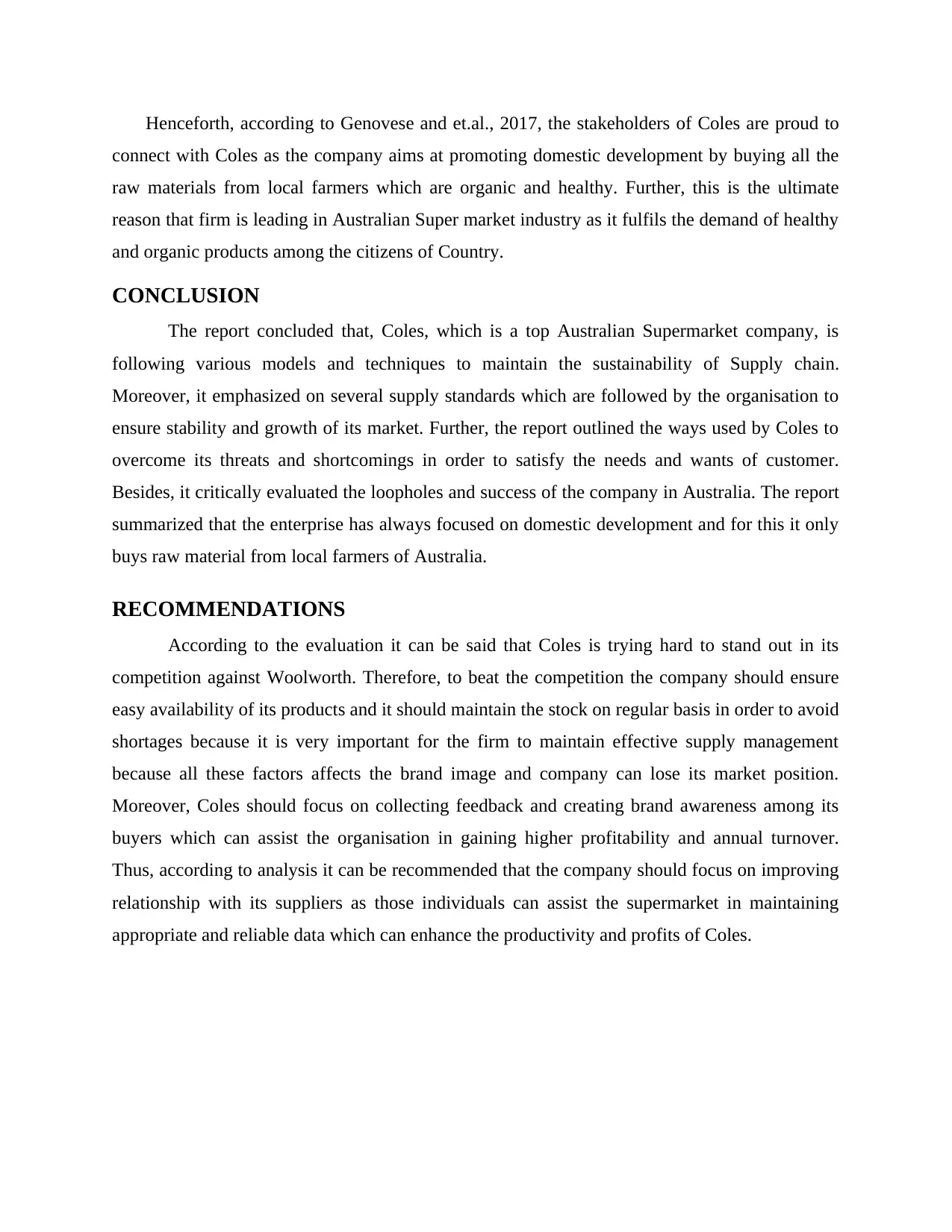
Henceforth, according to Genovese and et.al., 2017, the stakeholders of Coles are proud to
connect with Coles as the company aims at promoting domestic development by buying all the
raw materials from local farmers which are organic and healthy. Further, this is the ultimate
reason that firm is leading in Australian Super market industry as it fulfils the demand of healthy
and organic products among the citizens of Country.
CONCLUSION
The report concluded that, Coles, which is a top Australian Supermarket company, is
following various models and techniques to maintain the sustainability of Supply chain.
Moreover, it emphasized on several supply standards which are followed by the organisation to
ensure stability and growth of its market. Further, the report outlined the ways used by Coles to
overcome its threats and shortcomings in order to satisfy the needs and wants of customer.
Besides, it critically evaluated the loopholes and success of the company in Australia. The report
summarized that the enterprise has always focused on domestic development and for this it only
buys raw material from local farmers of Australia.
RECOMMENDATIONS
According to the evaluation it can be said that Coles is trying hard to stand out in its
competition against Woolworth. Therefore, to beat the competition the company should ensure
easy availability of its products and it should maintain the stock on regular basis in order to avoid
shortages because it is very important for the firm to maintain effective supply management
because all these factors affects the brand image and company can lose its market position.
Moreover, Coles should focus on collecting feedback and creating brand awareness among its
buyers which can assist the organisation in gaining higher profitability and annual turnover.
Thus, according to analysis it can be recommended that the company should focus on improving
relationship with its suppliers as those individuals can assist the supermarket in maintaining
appropriate and reliable data which can enhance the productivity and profits of Coles.
connect with Coles as the company aims at promoting domestic development by buying all the
raw materials from local farmers which are organic and healthy. Further, this is the ultimate
reason that firm is leading in Australian Super market industry as it fulfils the demand of healthy
and organic products among the citizens of Country.
CONCLUSION
The report concluded that, Coles, which is a top Australian Supermarket company, is
following various models and techniques to maintain the sustainability of Supply chain.
Moreover, it emphasized on several supply standards which are followed by the organisation to
ensure stability and growth of its market. Further, the report outlined the ways used by Coles to
overcome its threats and shortcomings in order to satisfy the needs and wants of customer.
Besides, it critically evaluated the loopholes and success of the company in Australia. The report
summarized that the enterprise has always focused on domestic development and for this it only
buys raw material from local farmers of Australia.
RECOMMENDATIONS
According to the evaluation it can be said that Coles is trying hard to stand out in its
competition against Woolworth. Therefore, to beat the competition the company should ensure
easy availability of its products and it should maintain the stock on regular basis in order to avoid
shortages because it is very important for the firm to maintain effective supply management
because all these factors affects the brand image and company can lose its market position.
Moreover, Coles should focus on collecting feedback and creating brand awareness among its
buyers which can assist the organisation in gaining higher profitability and annual turnover.
Thus, according to analysis it can be recommended that the company should focus on improving
relationship with its suppliers as those individuals can assist the supermarket in maintaining
appropriate and reliable data which can enhance the productivity and profits of Coles.
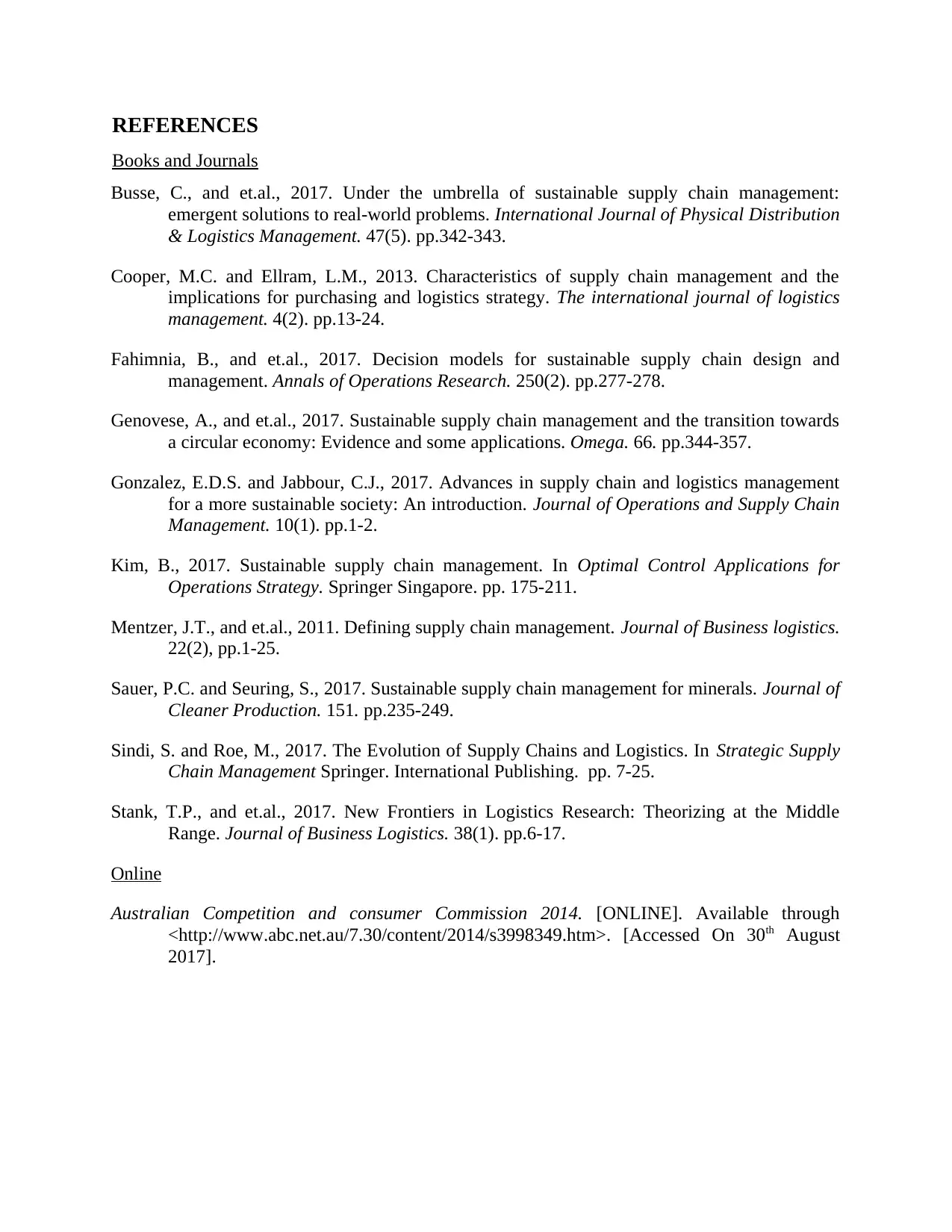
REFERENCES
Books and Journals
Busse, C., and et.al., 2017. Under the umbrella of sustainable supply chain management:
emergent solutions to real-world problems. International Journal of Physical Distribution
& Logistics Management. 47(5). pp.342-343.
Cooper, M.C. and Ellram, L.M., 2013. Characteristics of supply chain management and the
implications for purchasing and logistics strategy. The international journal of logistics
management. 4(2). pp.13-24.
Fahimnia, B., and et.al., 2017. Decision models for sustainable supply chain design and
management. Annals of Operations Research. 250(2). pp.277-278.
Genovese, A., and et.al., 2017. Sustainable supply chain management and the transition towards
a circular economy: Evidence and some applications. Omega. 66. pp.344-357.
Gonzalez, E.D.S. and Jabbour, C.J., 2017. Advances in supply chain and logistics management
for a more sustainable society: An introduction. Journal of Operations and Supply Chain
Management. 10(1). pp.1-2.
Kim, B., 2017. Sustainable supply chain management. In Optimal Control Applications for
Operations Strategy. Springer Singapore. pp. 175-211.
Mentzer, J.T., and et.al., 2011. Defining supply chain management. Journal of Business logistics.
22(2), pp.1-25.
Sauer, P.C. and Seuring, S., 2017. Sustainable supply chain management for minerals. Journal of
Cleaner Production. 151. pp.235-249.
Sindi, S. and Roe, M., 2017. The Evolution of Supply Chains and Logistics. In Strategic Supply
Chain Management Springer. International Publishing. pp. 7-25.
Stank, T.P., and et.al., 2017. New Frontiers in Logistics Research: Theorizing at the Middle
Range. Journal of Business Logistics. 38(1). pp.6-17.
Online
Australian Competition and consumer Commission 2014. [ONLINE]. Available through
<http://www.abc.net.au/7.30/content/2014/s3998349.htm>. [Accessed On 30th August
2017].
Books and Journals
Busse, C., and et.al., 2017. Under the umbrella of sustainable supply chain management:
emergent solutions to real-world problems. International Journal of Physical Distribution
& Logistics Management. 47(5). pp.342-343.
Cooper, M.C. and Ellram, L.M., 2013. Characteristics of supply chain management and the
implications for purchasing and logistics strategy. The international journal of logistics
management. 4(2). pp.13-24.
Fahimnia, B., and et.al., 2017. Decision models for sustainable supply chain design and
management. Annals of Operations Research. 250(2). pp.277-278.
Genovese, A., and et.al., 2017. Sustainable supply chain management and the transition towards
a circular economy: Evidence and some applications. Omega. 66. pp.344-357.
Gonzalez, E.D.S. and Jabbour, C.J., 2017. Advances in supply chain and logistics management
for a more sustainable society: An introduction. Journal of Operations and Supply Chain
Management. 10(1). pp.1-2.
Kim, B., 2017. Sustainable supply chain management. In Optimal Control Applications for
Operations Strategy. Springer Singapore. pp. 175-211.
Mentzer, J.T., and et.al., 2011. Defining supply chain management. Journal of Business logistics.
22(2), pp.1-25.
Sauer, P.C. and Seuring, S., 2017. Sustainable supply chain management for minerals. Journal of
Cleaner Production. 151. pp.235-249.
Sindi, S. and Roe, M., 2017. The Evolution of Supply Chains and Logistics. In Strategic Supply
Chain Management Springer. International Publishing. pp. 7-25.
Stank, T.P., and et.al., 2017. New Frontiers in Logistics Research: Theorizing at the Middle
Range. Journal of Business Logistics. 38(1). pp.6-17.
Online
Australian Competition and consumer Commission 2014. [ONLINE]. Available through
<http://www.abc.net.au/7.30/content/2014/s3998349.htm>. [Accessed On 30th August
2017].
⊘ This is a preview!⊘
Do you want full access?
Subscribe today to unlock all pages.

Trusted by 1+ million students worldwide

1 out of 10
Related Documents
Your All-in-One AI-Powered Toolkit for Academic Success.
+13062052269
info@desklib.com
Available 24*7 on WhatsApp / Email
![[object Object]](/_next/static/media/star-bottom.7253800d.svg)
Unlock your academic potential
Copyright © 2020–2025 A2Z Services. All Rights Reserved. Developed and managed by ZUCOL.




